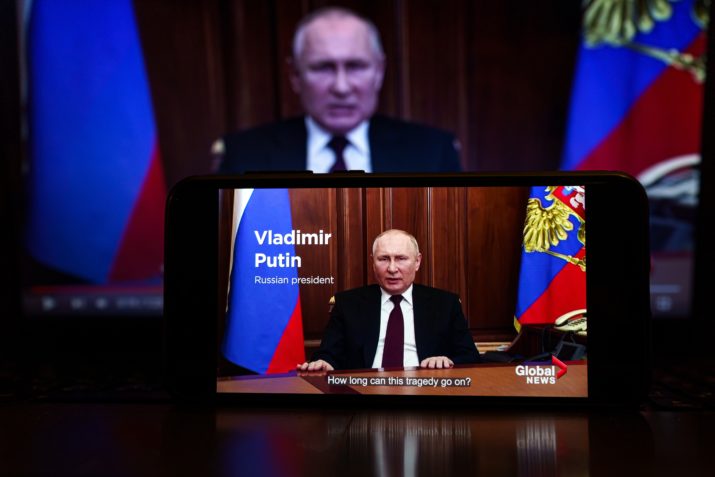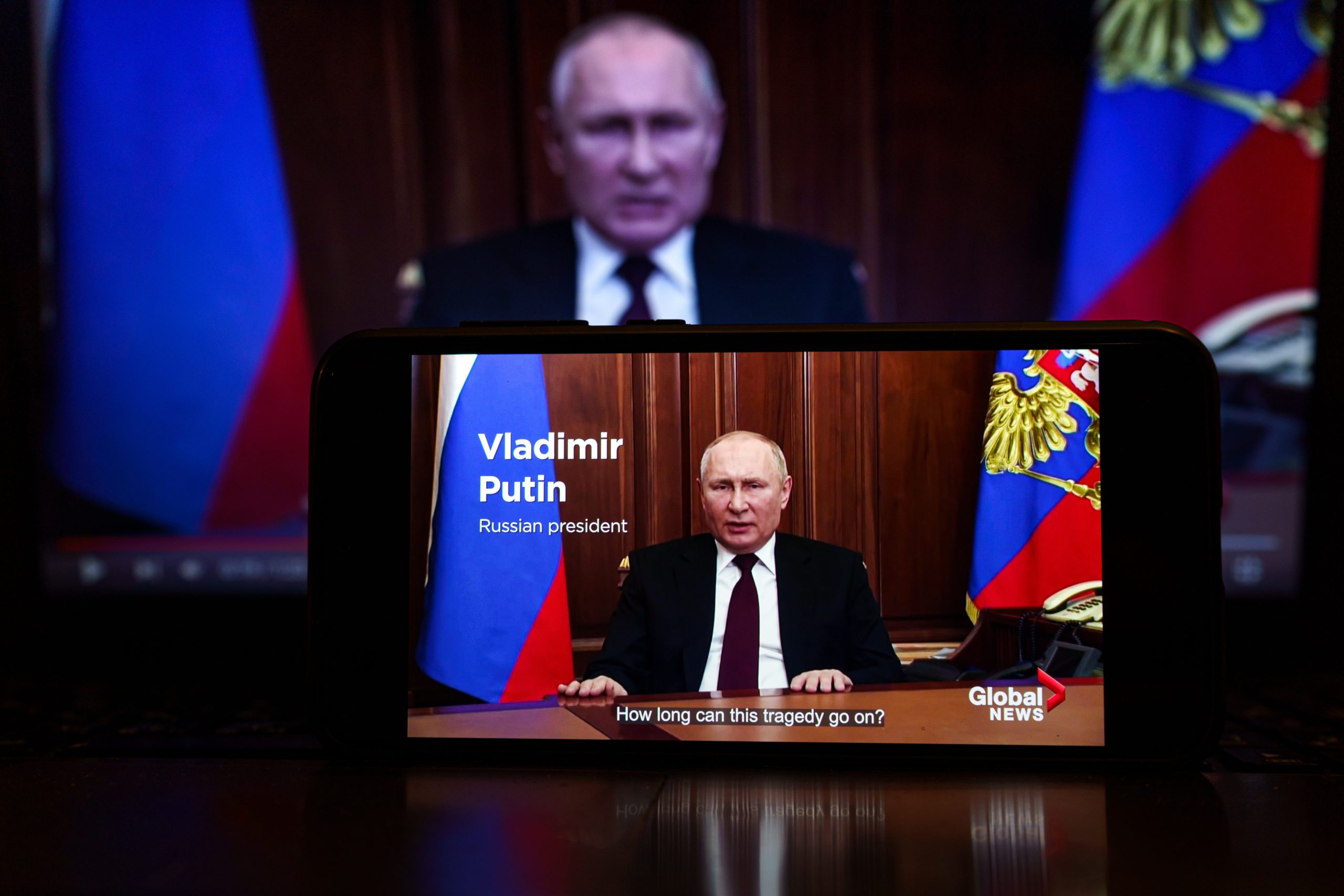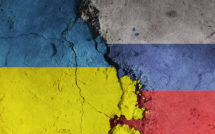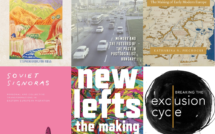

This is part of a series on the Ukraine crisis.
Remembered by his compatriots as the “Russian Socrates,” Grigory Skovoroda (1722-1794) merits distinction as the founder of Russia’s autochthonous philosophical tradition. That an entire millennium separated the trial and death of the better-known Athenian thinker and the birth of philosophy in Russia is noteworthy for two reasons. First, this fact points to the comparatively late development of academic philosophy in Russia. Second, it highlights the gulf that separated Russian and West European cultures into the eighteenth century. With respect to the first observation, we can safely say that the time during which Skovoroda lived was not markedly different from prior eras; despite his arrival on the scene, philosophy in Russia would remain, in the words of James Edie, James Scanlan, and Mary-Barbara Zeldin “uniquely non-academic and non-institutional.”[1] Regarding the second point, the shift from the seventeenth to the eighteenth century was a watershed moment: this marked the start of an ongoing period during which Russians became better acquainted with “Evropa.”
Tsar Peter I founded St. Petersburg in 1703 and subsequently (1712) made it the capital of his empire; from this “Window on the West,” he and his subjects could observe the goings-on of their European neighbors more clearly than they could from remote Moscow. The sweeping reforms of Peter and his eventual successor, the equally “great” Tsarina Catherine II, included substantial changes in educational practices and norms. French and German became the languages of the elite, and fluency in these foreign languages would remain necessary for bureaucrats and intellectuals into the nineteenth century. Importantly, while conversing in Romano-Germanic languages brought the educated classes closer to Europe, it sundered them from their countrymen, who continued to speak the vernacular.
Literate Russians of the eighteenth and nineteenth centuries more than compensated for the indifference their forebears had shown to Western authors generally and writers on politics in particular. Where Niccolò Machiavelli, Thomas Hobbes, and John Locke failed to find an audience in sixteenth- and seventeenth-century Russia, later European writers garnered appreciation, if not outright adoration. Catherine II read Montesquieu, corresponded with Voltaire, and feted Denis Diderot. Russian nobles hosted soirees and exchanged letters to discuss Friedrich Schiller, G.W.F. Hegel, and (eventually) Karl Marx.
But while Russia opened a window to the West, Westerners preferred to draw their own blinds; they showed, and continue to show, little interest in understanding Russia’s intellectual history. Vissarion Belinsky, Ivan Kireevsky, Aleksey Khomiakov, Ivan and Konstantin Aksakov, and Konstantin Leontiev remain, if not entirely unknown, then very unfamiliar to Westerners. None of these is a name that will appear on the reading list for a comprehensive exam in a political philosophy graduate program in the West. Even in the bourgeoning field of comparative political theory, one is more likely to find discussion of classical Chinese, medieval Islamic, or postcolonial African or Indian scholars than eighteenth- or nineteenth-century Russian authors.
We can make some sense of events unfolding in contemporary Russia by invoking names and ideas familiar to a Western eye; we gain a fuller picture, however, when we draw from Russia’s rich philosophical tradition. Here, I offer but a sketch of how we might view the machinations of President Vladimir Putin through the lens of political theory, with reference to both Western and Russian theorists and ideas.
American politicians and pundits frequently brandish a one-syllable epithet against Putin: “thug.” Sen. Dick Durbin (D-IL) recently applied the term.[2] So, too, did his Republican colleague from Illinois, Rep. Darin LaHood.[3] Various op-ed writers from across the political spectrum likewise bandy this word about. But “thug” connotes someone who relies on brute force. Force is unquestionably one tool that Putin has at his disposal, and it is something that he has not shied from using. But the Russian president is more sophisticated than most garden variety strongmen. Far from a thug, he is a Machiavellian leader par excellence.
The first sense in which Putin exhibits Machiavellian tendencies is with respect to his “virtùousness.” Machiavelli uses the term “virtù” to signify not moral propriety, but rather skill or adeptness. For leaders, the traits in question are those needed to gain and maintain power. Putin has obviously proven his adeptness at holding on to power. What is it that keeps him in office? Machiavelli recommends that a ruler learn from the example—positive and negative—of others. “A ruler should read historical works,” he says, “especially for the light they shed on the actions of eminent men: to find out how they waged war, to discover the reasons for their victories and defeats, in order to avoid reverses and achieve conquests.”[4] Russian history provides ample models of both successful and failed leadership. But Putin also has at his disposal the examples of neighboring politicians, some of whom have retained their grips on power, and others who lost it. Putin paid close attention to the so-called “Color Revolutions” of Georgia (“Rose Revolution,” 2003), Ukraine (“Orange Revolution,” 2004), and Kyrgyzstan (“Tulip Revolution,” 2005) and assiduously took steps to prevent the outbreak of anti-government unrest in his country. Are the use of force and KGB tactics (intimidation and blackmail) part of Putin’s toolkit? Absolutely. But force and the threat of force are not the sole deterrents to anti-government agitation. Putin has also weakened civil society in Russia[5] and curtailed the autonomy of the federation’s subjects (regional governments),[6] which has eroded the possibility of viable political challengers emerging.[7]
Putin also displays a Machiavellian approach to politics with regard to his realism. Machiavelli is (in)famous for his blunt “ends justifying the means” mentality with respect to the setting and achieving of goals. For Machiavelli, the political realm and the moral realm are separate. “A ruler who wishes to maintain his power must be prepared to act immorally when this becomes necessary,” he says. “How men live is so different from how they should live that a ruler who does not do what is generally done, but persists in doing what ought to be done, will undermine his power rather than maintain it.”[8] Neither the ruler nor the ruled ultimately expect soulcraft from government and laws. What both want—“the end which everyone aims at” —is “glory and riches.”[9] Machiavelli’s assertion is contestable and, to some readers, perhaps, contemptible. But if we look to our own democratic system, we find at least a kernel of truth in Machiavelli’s claim that, if we brush aside the high-soaring rhetoric in which politicians might couch their schemes, politics boils down largely to the quest for improved material wellbeing. Gov. Ronald Reagan concluded his final debate with incumbent President Jimmy Carter by asking voters to consider “Are you better off than you were four years ago?” Twelve years later, Gov. Bill Clinton used the presence of economic recession as a cudgel against President Reagan’s successor, President George H. W. Bush: “It’s the economy, stupid.” For both Reagan and Clinton, the economic argument resulted in electoral victory.
Putin does not lead or seek to lead a liberal democracy. Still, he relies on popular goodwill to maintain a sense of legitimacy. He enjoys this support, but at levels that have fallen from their heights. Early in his presidency, Putin earned approval by virtue of not being Boris Yeltsin. Where Yeltsin was affable but intoxicated and his presidency marked by radical change (including economic change that created a few super-winners and many big losers), Putin is sober and has brought stability. But stability, while attractive, goes only so far,[10] especially as the dramatic early days of the post-Soviet transition become more distant history. Russia is very rich in natural resources, but it is only a middling economy when its GDP per capita is compared with those of the rest of the post-communist world. Ordinary Russians are “doing better” than their peers in Turkmenistan, Tajikistan, Moldova, Belarus, and other states, but worse than residents of Estonia, Latvia, Lithuania, and other states. If what people care about is “gold and glory,” Putin has clearly failed to deliver on the first count, but he can deliver on the second. He can divert attention from Russia’s economic woes by tapping into patriotic sentiment. Multiple recent polls have shown that Joseph Stalin’s popularity has increased to greater than majority support since the collapse of the Soviet Union.[11] Why? Not because the Soviet Union was thriving economically under Stalin’s leadership, but because Russia, as the heart of the Soviet Union, was then a real player on the world stage.
This brings us to the present. Coverage of Russia has led the nightly news broadcasts for several weeks running as the threat of military conflict between Russia and Ukraine rises. “A ruler,” Machiavelli writes, “should have no other objective and no other concern, nor occupy himself with anything else except war and its methods and practices, for this pertains only to those who rule.”[12] But the war that Putin might undertake will have contours unique to Russia. A brief survey of key movements in Russian intellectual history can help highlight these features.
In a series of “Philosophical Letters,” circulated between 1826 and 1831, Pyotr Chaadaev laid down the gauntlet for his countrymen.We belong to none of the great families of mankind; we are neither of the West nor of the East, and we possess the traditions of neither. Somehow divorced from time and space, the universal education of mankind has not touched upon us.”[13] Chaadaev continues: “Isolated in the world, we have given nothing to the world; we have not added a single idea to the mass of human ideas; we have contributed nothing to the progress of the human spirit. And we have disfigured everything we touched of that progress.”[14] With these provocative words, Chaadaev initiated what became the debate of nineteenth-century Russia, which pitted so-called “Westernizers” against the “Slavophiles.” Members of the former camp believed that if Russia were to have a future, it would be as part of Europe, with the continued spread in Russia of Western reforms and traditions. Their intellectual opponents averred that Russia should reclaim its unique heritage and then develop organically, insisting that Peter I set Russia on the wrong course by introducing artificial institutions and by mandating practices unsuitable for Russia and Russians.
The Westernizing camp became more radical as the nineteenth century unfolded: the reformers of the 1840s and 1850s gave way to the anarchists, nihilists, and communists of the 1860s and 1870s. The Slavophile camp developed similarly: authors who were content to champion the legitimacy of native practices and values for Russians paved the way for more assertive thinkers, pan-Slavs, who sought to export those ways and beliefs beyond Russia’s borders. The motto of Tsar Nicholas I became the motto of the pan-Slavs: “Orthodoxy, Autocracy, and Nationality.”
Nikoai Danilevsky typifies pan-Slav sentiment. In Russia and Europe (1869), Danilevsky declares that “the most important goal of Russian state policy, which it must never renounce, is the liberation of the Slavs from the Turkish yoke, and the destruction of Ottoman power and the Turkish state itself.”[15] Danilevsky was not alone in supporting a hypothetical Russian military campaign against the Ottoman Empire, which would become a reality in 1877 when the Russo-Turkish War began. The Ottoman Empire was not the only neighbor that Danilevsky regarded with contempt; Danilevsky recognized that Slavs languished not only as subjects of the Turkish suzerain, but also under the yoke of European monarchs like the Austrian kaiser. Knowing that neither Austria nor any other European state would part with the Slav-populated parts of its territory, Danilevsky foresaw “an ongoing recurrent struggle with Europe, without which Slavdom cannot fulfill its destiny.”[16]
The appeal of pan-Slavism outside of Russia has waxed and waned over time. Orthodox Serbia and Russia have traditionally enjoyed strong relations. But even more westerly Slavs, who share only ethnic and linguistic affinities with Russians—not religious—have from time to time broached the possibility of union with Russia. In his recollections, Tomáš Masaryk, the first president of Czechoslovakia after its creation in the aftermath of World War I, conceded that it was not inevitable that his country would be an independent democracy: at the start of the war, he considered advocating the Russian tsar’s taking the reins from the Austrian kaiser.[17]
The Slavophile-Westernizer debate that emerged in the nineteenth century remains unsettled. Now, as then, there are actors who believe that Russia must remain authentically Russian and those who believe that Russia should emulate and join the West. Putin clearly thinks that Russia is separate from the West and that its future lies apart from it; in his speeches and public proclamations he admits as much. To him, that future is threatened when a core part of the Orthodox and East Slavic sphere (i.e., Ukraine) does not share his vision and starts looking westward. What the Slovak writer and politician Ľudovít Štúr, himself a pan-Slav, wrote in the nineteenth century merits sober consideration today: “Only a fool could believe that a republican form of government might take hold in Russia and develop there. In the case of the states in her sphere of influence, Russia will fight tooth and nail against anything she does not, nor ever could, allow within her own proper borders.”[18]
Matthew Slaboch serves as a visiting assistant professor in the Department of Politics and Public Affairs at Denison University, where he teaches courses in political theory and comparative politics. He previously held a research fellowship at the James Madison Program in the Department of Politics at Princeton University. He earned his PhD in Political Science from Indiana University. His first book, A Road to Nowhere: The Idea of Progress and Its Critics(University of Pennsylvania Press, 2018), examines proponents and skeptics of the idea of historical progress in nineteenth- and twentieth-century Germany, Russia, and America.
References
[1] James Edie, James Scanlan, and Mary-Barbara Zeldin, “Preface,” in The Beginnings of Russian Philosophy; The Slavophiles; The Westernizers, vol. 1 of Russian Philosophy, ed. James Edie, James Scanlan, and Mary-Barbara Zeldin (Knoxville: University of Tennessee Press, 1976), ix.
[2] Haas, Blake. “Senator Durbin: Russia Appears to Be Pulling Some Troops Back, Calls Putin a ‘Thug.’” WJBC, 15 Feb. 2022, https://www.wjbc.com/2022/02/15/senator-durbin-russia-appears-to-be-pulling-some-troops-back-calls-putin-a-thug/.
[3] Teske, Gretchen, and Matt Sheehan. “On the Record: LaHood Talks Ukraine, Masks, January 6, Elections.” Central Illinois Proud, 16 Feb. 2022, https://www.centralillinoisproud.com/news/politics/on-the-record/lahood-talks-ukraine-masks-january-6-elections/.
[4] Machiavelli, Niccolò. The Prince, ed. Quentin Skinner and Russell Price (Cambridge: Cambridge University Press, 2009), 53.
[5] Robertson, Graeme B. “Managing society: protest, civil society, and regime in Putin’s Russia.” Slavic Review 68.3 (2009): 528-547.
[6] Konitzer, Andrew, and Stephen K. Wegren. “Federalism and political recentralization in the Russian Federation: United Russia as the party of power.” Publius: The journal of federalism 36.4 (2006): 503-522.
[7] The Machiavellian tactics that Putin employs are too numerous to mention in a piece of this brevity. But another one of note is with respect to religion. Machiavelli recommends that a ruler “make use of religion” as a “cloak.” That is, the ruler should appeal to his subjects’ faith to justify pursuing what he wants, even if his true motives are from noble (Machiavelli, 77). Here we might note the close relationship between Putin and the Russian Orthodox Church.
[8] Machiavelli, 54-55.
[9] Ibid., 85.
[10] As Jean-Jacques Rousseau writes in The Social Contract, “It will be said that the despot assures his subjects civil tranquility… Tranquility is found also in dungeons; but is that enough to make them desirable places to live in?” Rousseau, Jean-Jacques. On the Social Contract. Trans. G. D. H. Cole. (New York: Dover Publications), 2003, 5.
[11] “Stalin’s Approval Rating Among Russians Hits Record High – Poll.” The Moscow Times, 16 Apr. 2019, https://www.themoscowtimes.com/2019/04/16/stalins-approval-rating-among-russians-hits-record-high-poll-a65245.
[12] Machiavelli, 51-52.
[13] Peter Chaadayev, “Philosophical Letters,” in Edie, Scanlan, and Zeldin, The Beginnings of Russian Philosophy, 109.
[14] Ibid., 116.
[15] Nikolai I. Danilevskii, Russia and Europe: The Slavic World’s Political and Cultural Relations with the Germanic-Roman West, trans. Stephen M. Woodburn (Bloomington, IN: Slavica, 2013), 291.
[16] Ibid., 369.
[17] Masaryk was personally ambivalent about Russia. But he recognized the Russophilism of his brethren. Wrote Masaryk: “Bohemians are … strongly Slavophile … thoroughly Russophile. A Russian dynasty, in whatever form would be most popular … the Bohemian politicians wish the establishment of the kingdom of Bohemia in full accordance with Russia” (cited in May, Arthur J. The Passing of the Hapsburg Monarchy, 1914-1918, Volume 1. [Philadelphia: University of Pennsylvania Press], 2016, 265).
[18] Štúr L̕udovít. Slavdom: A Selection of His Writings, in Prose and Verse. Translated by Charles S. Kraszewski, Glagoslav Publications, 2021, 272-273.




